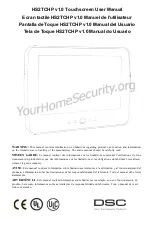
2-13
It may be necessary to remove some sheet metal to gain access to the anode
lead—be very careful to do this without making contact to the anode lead itself.
Carefully discharge the CRT using the following procedure:
1
Connect a clip lead or a heavy-gauge wire to the mounting ears or the spring-
tensioned ground strap.
2
Connect the other end of the clip lead or wire to the stem of a flat blade
screwdriver that has an insulated handle.
3
Hold the screwdriver by the insulated handle only. Insert the blade of the
screwdriver under the rubber boot and make contact with the anode lead at
the button. A distinct “snap” may or may not be heard as it discharges,
depending on the amount of charge present on the anode.
4
Disconnect the anode lead from the button by unhooking the spring wire
clips. Note the location of the anode for proper CRT orientation during
reassembly.
WARNING
The CRT will regain a charge over time, even after it has been discharged. To avoid a
dangerous electric shock, always discharge the CRT just before handling it, and treat it
with respect thereafter.
Remove the Electronic Chassis
Continue disassembling the display until the face of the CRT is completely
exposed. The degree of disassembly required will vary from display to display.
Normally the next step will be to remove the electronics chassis from the
display. This requires removal of a small circuit board that is usually plugged
into the socket on the end of the CRT. The circuit board is often glued to the
CRT socket with a soft adhesive which must be cut away to remove the board.
Several cables must also be unplugged from the electronics. Typically these
cables are:
• Four wires from the yoke of the CRT, typically in a single four-pin
connector. The yoke is the copper wire and magnet assembly at the base of
the neck of the CRT. MPR II-compliant monitors may have additional cables
and connectors on the yoke.
• A two-wire cable from the degaussing coil. This coil may be attached to the
CRT, or be laying out of sight between the CRT and the bezel. Some
monitors may have two separate coils.
• A one- or two-wire ground cable connected between the CRT circuit board
and a ground strap. This strap is a long, uninsulated, braided wire which is
spring-tensioned to maintain contact with the bell of the CRT.
• Various cables connected to the power switch, pilot light, front panel
controls, etc.
Summary of Contents for IntelliTouch SecureTouch
Page 1: ......
Page 4: ...ii...
Page 10: ...viii...
Page 12: ...x...
Page 60: ...2 48 I n t e l l i T o u c h S e c u r e T o u c h G u i d e...
Page 105: ......


































